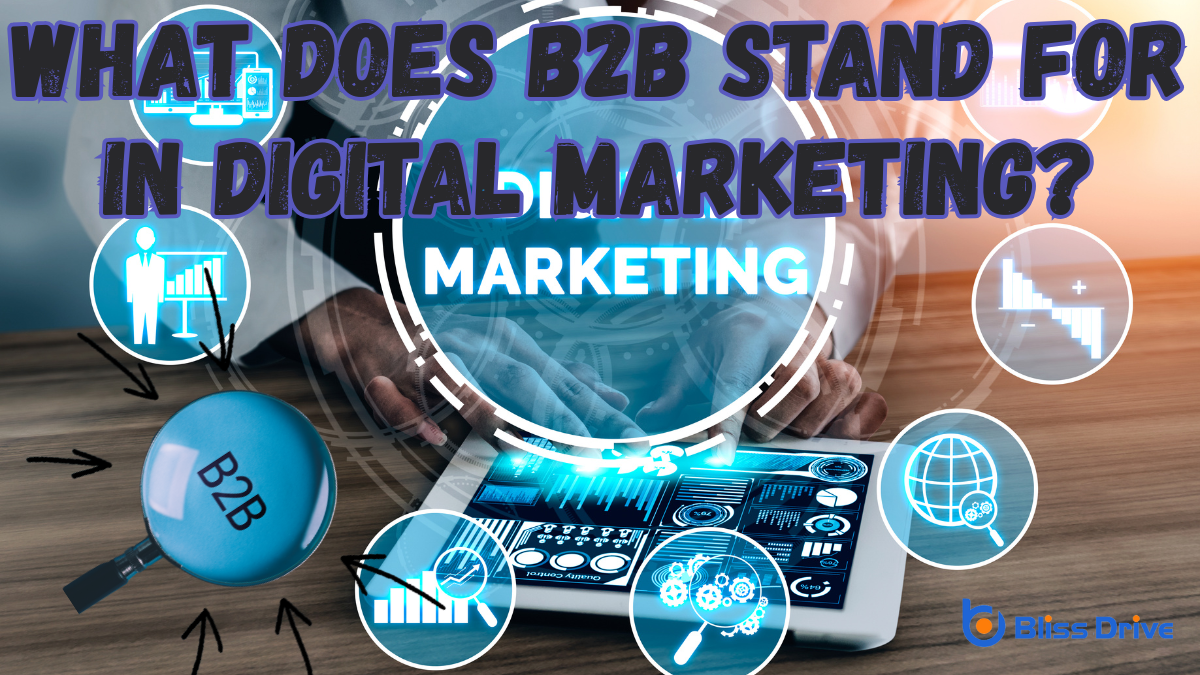Learn More About Us

In digital marketing, B2B stands for "Business-to-Business," highlighting interactions between companies rather than individual consumers. We often focus on building relationships and delivering value through tailored strategies. This approach requires understanding complex decision-making processes and addressing the unique challenges businesses face. As the digital landscape evolves, we're seeing innovative ways to engage and grow. Curious about how these strategies can shape the future of industries? Let's explore further.
In the domain of digital marketing, understanding Business-to-Business (B2B) is essential. B2B refers to transactions where businesses sell products or services to other businesses. Unlike consumer-focused marketing, B2B involves complex decision-making processes and longer sales cycles.
We need to grasp this because it influences how we approach marketing strategies, focusing on relationship-building and demonstrating value over time. B2B marketing often involves more detailed and technical content, catering to informed buyers who seek efficiency and expertise.
Recognizing the importance of B2B helps us appreciate its role in driving innovation and growth across industries. When businesses connect and collaborate effectively, they create robust supply chains and enhance their competitive edge.
Our efforts in B2B marketing can greatly impact an organization's success and its industry position.

Although both B2B and Business-to-Consumer (B2C) marketing aim to drive sales and growth, they diverge considerably in their strategies and execution.
In B2B marketing, we focus on building long-term relationships with other businesses. Decisions often involve multiple stakeholders, requiring detailed information and a logical approach. Our content is typically more informative and technical, catering to industry-specific needs.
In contrast, B2C marketing targets individual consumers. We emphasize emotion-driven content, often aiming for quick decision-making and impulse buying. Our strategies might include eye-catching advertisements and promotions to capture interest quickly.
Furthermore, the sales cycle in B2B is generally longer, with more emphasis on nurturing leads over time.
In B2C, the focus is often on immediate conversions and brand loyaltyThe tendency of consumers to continue buying the same brand's products or services..
Let's explore how we can strengthen our B2B digital marketing efforts through effective content marketingA strategic approach focused on creating and distributing valuable, relevant, and consistent content... tactics and leadA potential customer referred by an affiliate who has shown interest in the product or service but h... generation techniques.
By creating valuable, targeted content, we can establish authority and foster trust with potential clients.
Additionally, implementing strategic lead generation methods will help us attract and convert the right prospects into long-term business partners.
Effective content marketing tactics are essential for B2B digital marketing success.
Let's focus on creating valuable, informative content tailored to our target audience. By understanding our audience's needs and challenges, we can craft content that resonates and builds trust.
Consistency is key; regular blog posts, whitepapersAuthoritative reports or guides that address complex issues and provide solutions., and case studiesIn-depth analyses of specific instances or examples to highlight success stories or lessons learned.... keep our brand top-of-mind.
Utilizing various formats like videos, webinarsLive or recorded online presentations or seminars used to educate and engage an audience., and podcastsAudio content distributed through digital channels, often in series format. diversifies our content, reaching wider audiences.
We must leverage social media platforms to amplify our message and engage directly with potential clients.
SEO optimization guarantees our content is discoverable, driving organic trafficVisitors who come to a website through unpaid search engine results. to our site.
Finally, measuring performance through analyticsThe systematic computational analysis of data or statistics to gain insights and support decision-ma... helps refine our tactics. By evaluating what works, we can adapt and consistently deliver impactful content.
To drive successful lead generation in B2B digital marketing, we must implement strategies that capture and nurture potential clients effectively.
First, let's focus on optimizing our website with clear calls-to-action and user-friendly navigation to guide visitors toward conversionThe completion of a desired action by a referred user, such as making a purchase or filling out a fo....
Next, we should leverage content marketing by offering valuable resources like eBooksLong-form digital publications used to provide in-depth information on a specific topic. or webinars in exchange for contact information.
Utilizing social media platforms allows us to engage directly with prospects and drive traffic to our landing pages.
Email marketingThe use of email to promote products or services, build relationships with potential customers, and ... is another powerful tool, enabling us to nurture leads by delivering personalized content.
Additionally, employing data analytics helps us identify which channels and tactics are most effective, allowing us to refine our approach.
Let's explore how content marketing plays a pivotal role in B2B by crafting valuable content that captures our target audience's attention.
By focusing on their needs and challenges, we can engage them effectively and foster stronger connections.
This strategy not only keeps them interested but also builds our brand authority in the marketplace.
When it comes to B2B marketing, crafting valuable content is essential for building trust and establishing authority in the industry. We need to focus on delivering insights that not only inform but also resonate with our audience’s needs.
High-quality content showcases our expertise and fosters long-term relationships with clients by addressing their specific challenges.
We’re not just sharing information; we’re curating content that answers questions, solves problems, and guides decision-making. To achieve this, our content must be well-researched, relevant, and actionable.
By doing so, we position ourselves as thought leaders, distinguishing our brand in a crowded market.
Let’s prioritize understanding our audience's pain points and tailor our content to provide solutions. Through strategic content creation, we can effectively communicate value and drive engagement.
How do we capture and hold the attention of our B2B audience in a digital landscape teeming with information? We achieve this by leveraging content marketing to create meaningful connections.
Our goal is to provide value through content that speaks directly to our audience's needs and challenges. By understanding their pain points, we can tailor our messages to resonate deeply.
We must focus on delivering insights, solutions, and expertise that stand out amidst the noise. Engaging content isn't just about delivering information; it's about creating a dialogue.
Interactive formats like webinars or Q&A sessions invite participation, making our audience feel heard and valued. Consistent engagement helps us build trust and fosters long-term relationships, essential for B2B success.
Establishing brand authority in the B2B space isn't just about being known; it's about being trusted and respected as an industry leader. To achieve this, content marketing is our strongest ally. By consistently providing valuable and insightful content, we show our audience that we recognize their challenges and can offerThe specific product or service being promoted by affiliates. solutions.
Whitepapers, case studies, and how-to guides demonstrate our expertise and build credibility.
When we create content, let's focus on addressing specific pain points. This way, we're not just talking at our audience; we're engaging with them in meaningful conversations.
Sharing real-world solutions and success storiesA feature on platforms like Instagram and Facebook where users can post photos and videos that disap... fosters trust. As we keep producing high-quality content, we reinforce our position as thought leaders, making our brand the go-to source in our industry.

Although B2B companies have traditionally relied on more direct forms of communication, leveraging social media has become increasingly vital for engaging with business clients. We can no longer ignore platforms like LinkedIn, TwitterA microblogging and social networking service where users post and interact with messages known as "..., and even FacebookA social networking site where users can post comments, share photographs, and links to news or othe....
These platforms allow us to showcase industry expertise and build authentic relationships. By sharing insightful content, we can position ourselves as thought leaders and foster trust with potential clients.
Social media also provides real-time interaction opportunities, letting us engage in conversations that matter to our audience. It’s important we maintain consistency in our messaging and actively participate in discussions relevant to our industry.
This not only strengthens our brand presence but also helps us stay top-of-mind when clients are ready to make decisions. Let’s embrace social media for meaningful B2B engagement.
While social media enhances our engagement strategies, data analytics transforms how we comprehend and predict client behavior in B2B marketing. By analyzing data, we gain insights into buying patterns, preferences, and needs, allowing us to tailor our approaches effectively.
We’re no longer shooting in the dark; instead, we craft data-driven strategies that resonate with our audience.
Through analytics, we identify which campaigns succeed and where improvements are needed. This empowers us to allocate resources wisely and maximize ROI.
Predictive analyticsTechniques that use historical data to predict future outcomes. allows us to foresee trends and adjust strategies proactively. With data as our guide, we can personalize interactions, enhancing customer satisfaction and loyalty.
Embracing data analytics guarantees we stay competitive and relevant in the ever-evolving B2B landscape.
As we look to the future of B2B digital marketing, several trends are set to redefine how we engage with clients and prospects.
One key trend is the increasing use of artificial intelligence. AI will help us personalize content and automate tasks, enhancing efficiency and client satisfaction.
Additionally, embracing omnichannel strategies will allow us to provide seamless experiences across different platforms, meeting prospects where they are.
Data privacyProtecting data from unauthorized access and ensuring the privacy of individuals' information. will also remain a top priority. We must guarantee that our data practices are transparent and compliant with regulations, fostering trust with clients.
Finally, leveraging advanced analytics will enable us to make data-driven decisions, predicting client needs more accurately.
To summarize, we recognize that B2B digital marketing is all about building strong business relationships and crafting strategies that meet the unique needs of companies. We've explored how content marketing, social media, and data analytics play pivotal roles in engaging stakeholders and driving growth. As we look ahead, staying adaptive and innovative will be key to steering future trends. Let's continue leveraging these strategies to push the boundaries of what's possible in B2B marketing.
